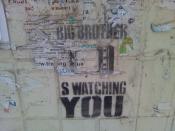When reading a piece of literature, one can most always see recurring themes, ideas, characters and underlying messages. We see literary work as a diverse collection of thoughts and ideas, but if something we see as dynamic is really a clichéd story, how dynamic is our literature? When looking objectively at literature, you can break it into a few different recurring themes.
One of the most common themes occurs when an individual character is pitted against the masses. The person dares to think or feel differently and they are persecuted for it. We all feel this way at times, therefore we can relate to the character with ease. The reader becomes completely absorbed in the character and their way of thinking, at which point they feel a deeper understanding of their reasoning. This makes the theme not merely the protagonist vs. society, but the reader vs. society. When we feel strongly about something, we get more immersed.
As we delve into the book we feel a powerful bond with the key players. The reader is the protagonist's only support - or so it seems. Obviously, this is one of the reasons this literary device is so powerful; it makes it personal. More intimate.
I cannot think of a better example of this than the character of Winston from George Orwell's Nineteen Eighty-Four. Winston Smith is a superb and extreme example of the Individual Vs. Society theme. He starts as just another member of the downtrodden mass in Oceania, a world where disinformation and propaganda are commonplace. All of those surrounding Winston think a certain way - the way they have been told to think. Nobody doubts the authoritarian regime represented by figurehead "Big Brother". Plastered throughout this desolate world are slogans such as "IGNORANCE IS BLISS", "FREEDOM IS SLAVERY...


